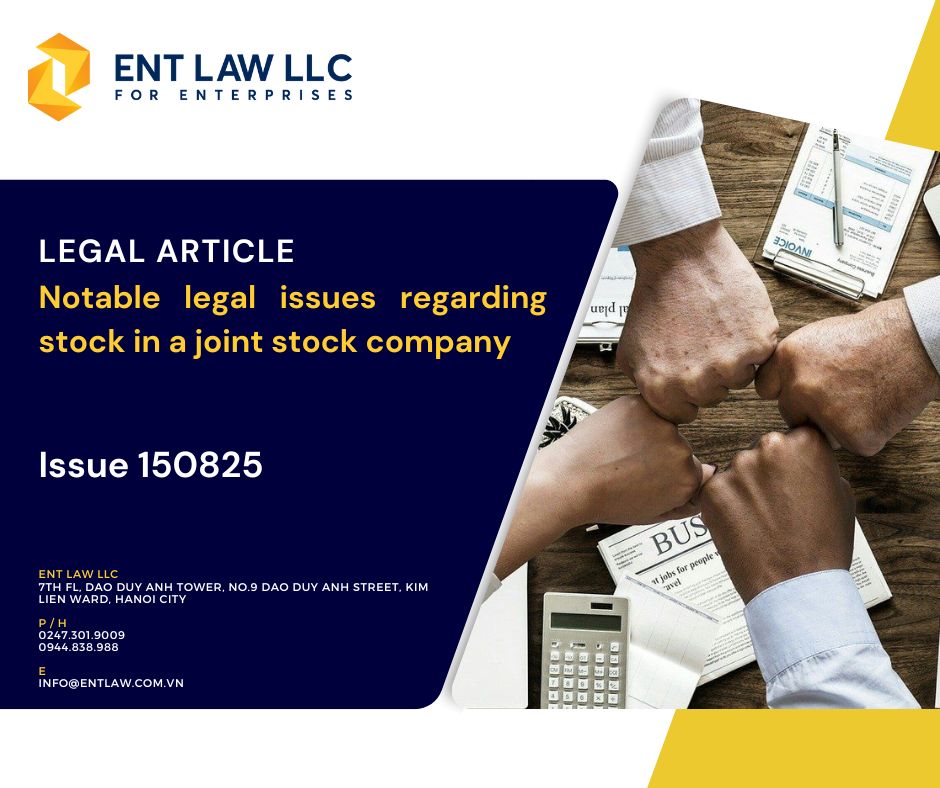Dear Valued Clients,
According to the Law on Enterprises 2020, as amended and supplemented in 2022 and 2025 (“LOE”), stock is a certificate issued by a joint stock company (“JSC”), a book entry, or electronic data confirming the ownership of one or several shares of such company.
A stock serves as legal evidence of the shareholder status and the corresponding rights and obligations of the owner. For a more in-depth understanding of the legal issues relating to stocks, we invite you to refer to this article.
1. Mandatory contents on stock certificate
According to the provisions of Article 121 of the LOE, a stock certificate must fully display the following information:
i. Name, enterprise code, and head office address of the company;
ii. Number of shares and type of shares;
iii. Par value of each share and total par value of the shares recorded on the stock;
iv. Full name, contact address, nationality, and number of legal personal identification papers of the shareholder being an individual; name, enterprise code or number of legal papers of the organization, and head office address of the shareholder being an organization;
v. Signature of the legal representative of the company;
vi. Number of registration in the company’s register of shareholders and date of issuance of the stock;
vii. Other contents in accordance with Articles 116, 117, and 118 of the LOE for stocks of preference shares.
2. Classification and characteristics of stocks
Based on the type of share represented, stocks are generally classified into two main categories:
i. Common stock: Represents ordinary shares and carries the full set of fundamental shareholders rights, including:
- The right to vote at the General Meeting of Shareholders;
- The right to receive dividends in proportion to the company’s business performance;
- The pre-emptive right to purchase newly issued shares;
- The right to receive the remaining assets upon the company dissolution or bankruptcy.
(ii) Preferred stock: Represents preference shares, including:
- Dividend preferred stock: Entitles the holder to dividends at a fixed rate or at a rate higher than that of common stock.
- Voting preferred stock: Grants more voting rights than common stock but is subject to transfer restrictions.
- Redeemable preferred stock: The contributed capital is repaid by the company at the request of the shareholders or in accordance with the conditions stated on the stock certificate.
3. Issuance of stock
The issuance of stock is the primary means by which a joint stock company raises capital. Depending on the company’s objectives and the target investors, one of the following two methods may be adopted:
(i) Private placement: An offering of stock conducted without using mass media, made to fewer than 100 investors (excluding professional securities investors), or made solely to professional securities investors
- For a joint stock company that has not yet attained public company status, the offering must comply with the LOE and the company’s charter.
- For a public company, private placement must also comply to the Law on Securities, which sets out requirements relating to eligible purchasers, transfer restriction periods, and other statutory conditions.
(ii) Public offering: An offering of stock made to 100 or more investors, excluding professional securities investors, to an unspecified number of investors, or via mass media:
- Applicable exclusively to public companies;
- Requires compliance with the Law on Securities, including registration with the State Securities Commission, publication of a prospectus, satisfaction of minimum charter capital and business performance thresholds, and fulfillment of all other legal requirements.
- The choice between these issuance methods depends not only on the company’s capital-raising objectives but also on its legal status, the target investors base, and the applicable regulatory framework.Therefore, before proceeding, the company shall carefully review the relevant conditions, procedural requirements, and information disclosure obligations to ensure compliance, mitigate legal risks, and maximize the efficiency of the capital-raising process.
As usual, we hope you find this article useful and look forward to working with you in the near future.
Kind regards,
ENT Law LLC.

 Tiếng Việt
Tiếng Việt


Issue of February 2026 – Decision No. 92/QD-BTC on enterprise registration and establishment procedures
Dear Valued Clients, The Ministry of Finance (MoF) issued Decision No. 92/QD-BTC (“Decision 92”) on January 19, 2026,...
Feb
Issue of January 2026 – Decree No. 20/2026/ND-CP Guiding Resolution No. 198/2025/QH15 on the Development of the Private Economy
Dear Valued Clients, Decree No. 20/2026/ND-CP (“Decree 20”) was promulgated by the Government on January 15, 2026, providing...
Jan
RECRUITMENT ANNOUNCEMENT
Position Lawyer / Trainee Lawyer(Priority given to candidates who are currently enrolled in or have completed the Lawyer...
Jan
Issue of December 2025 – Amended Personal Income Tax Law
Dear Valued Clients, The National Assembly of Vietnam officially adopted the Fourth Draft of the Law on Personal...
Dec